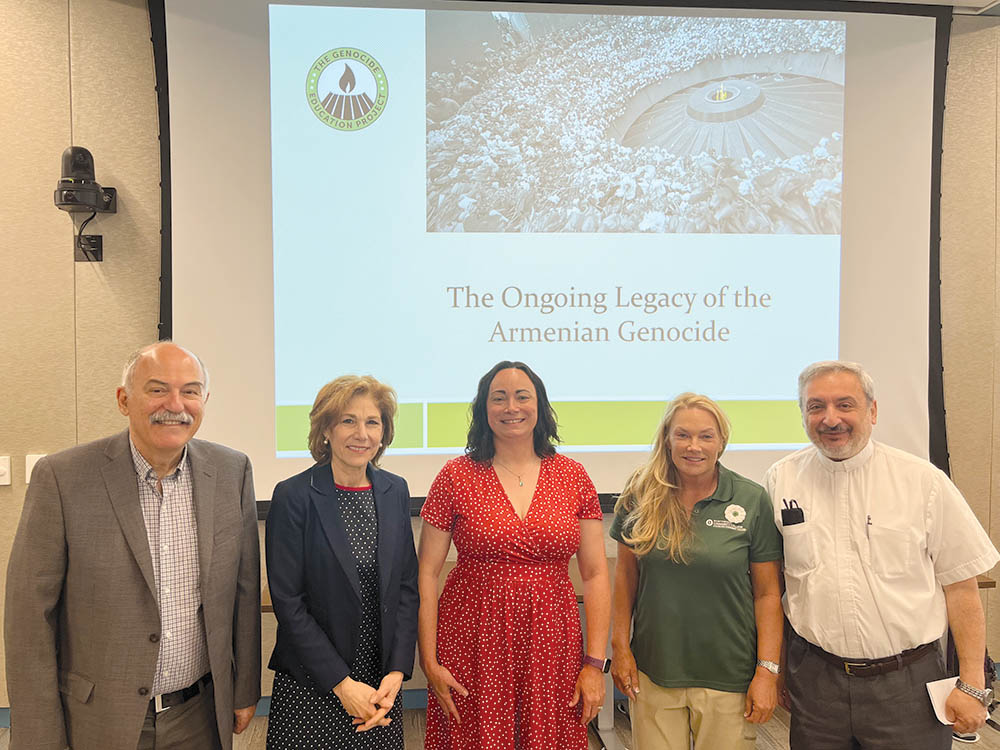
Photo: ASP Archive
Staff Report
The Armenian Studies Program, Fresno State, the St. Apkar Armenian Apostolic Church of Scottsdale, Arizona, and Scottsdale Community College (SCC) hosted a one-day workshop “Teaching About Genocide-The Armenian Genocide: A Case Study,” on Saturday, April 22, 2023. Twenty-two teachers from the local area participated in the workshop which featured several presentations.
SCC Professor of Anthropology Dr. Lisa Marsio gave opening remarks. She was a key member of the workshop organizing team, which included Armenian Studies Program Prof. Barlow Der Mugrdechian and Fr. Zacharia Saribekyan, Pastor of St. Apkar Armenian Apostolic Church. Welcoming remarks were given by Roxanne Makasdjian, Executive Director of The Genocide Education Project (GenEd), who emphasized the importance of such gatherings in educating future generations of students.
Special guest Scottsdale Community College President Dr. Eric Leshinskie addressed the workshop participants, welcoming them to SCC. He reiterated his support for the workshop and affirmed that SCC would support more workshops on the Armenian Genocide in the future.
The workshop, led by the San Francisco-based The Genocide Education Project, explored the teaching of modern-era genocide through its prototype, the Armenian Genocide.
Educators were introduced to a variety of primary and secondary source teaching materials to help them effectively include Genocide in high school social studies and English language arts curriculum.
Kerri Flynn, Education Director of The Genocide Education Project, spoke on “Setting a Purpose for Teaching About Genocide and the American Indian Boarding Experience.” In her interactive presentation, Flynn engaged participants in thinking about Genocide in general and about some of the challenges in teaching about Genocide. She used the American Indian Boarding Experience to illustrate how teachers could engage students in learning about genocides.
Prof. Barlow Der Mugrdechian then gave a presentation on the “The History of the Armenian Genocide,” focusing on key issues such as who were the perpetrators, the documentation of the Armenian Genocide, long-term effects of the Genocide, and efforts to affirm the Genocide. His overview of the history of the Genocide gave participants an opportunity to learn about the scope of the Genocide.
After a brief break, Kerri Flynn gave a presentation on “Teaching the Armenian Genocide.” Teachers were provided a variety of resources to take back to their classrooms. The teachers actively participated in the workshop, bringing in a variety of points of view. They also asked many interesting questions which contributed to the interactive nature of the workshop.
During the lunch break, a special flower-laying ceremony at the Armenian Genocide Monument on the Scottsdale Community College campus was held. Scottsdale Mayor David Ortega welcomed the teachers and guests to Scottsdale and read a proclamation from the Scottsdale City Council recognizing April 24 as “Armenian Genocide Day.”
Fr. Saribekyan explained the significance of the Genocide Monument and its symbolism. The circular memorial, erected in 2015 on the 100th anniversary of the Armenian Genocide, was sculpted by Armenian artist Gaspar Gharibyan out of “tufa” stone, a traditional Armenian building material. The Monument, dedicated to “all genocide and holocaust martyrs,” was gifted to the college by Arizona’s Armenian community and the Western Diocese of the Armenian Church. As Scottsdale Community College is located on Native American land, the monument combines Native American elements and symbols with traditional Armenian symbols.
After the ceremony and a lunch break, Dr. Garine Palandjian, Ph.D. in Educational Policy and Evaluation at Arizona State University, spoke on “Listening to Survivor Descendant Testimony.” She discussed her own personal journey of learning about the Armenian Genocide, as told through the story of her grandmother. This journey put a personal face on the Genocide and engaged participants in thinking about the micro-effects of the Armenian Genocide, as survivor families still struggle with the after-effects of the Genocide.
Roxanne Makasdjian concluded the workshop with a presentation on “Armenia Today: The Impact of Denial and the Conflict in Artsakh,” which gave an overview of the Turkish government denial of the Genocide. She brought in the example of the current conflict in Artsakh as a demonstration of the how denial is still having an impact today.
The “Teaching About the Armenian Genocide” workshop was successful, and plans are already under way for future such workshops at Scottsdale Community College.
 Hye Sharzhoom Armenian Action
Hye Sharzhoom Armenian Action